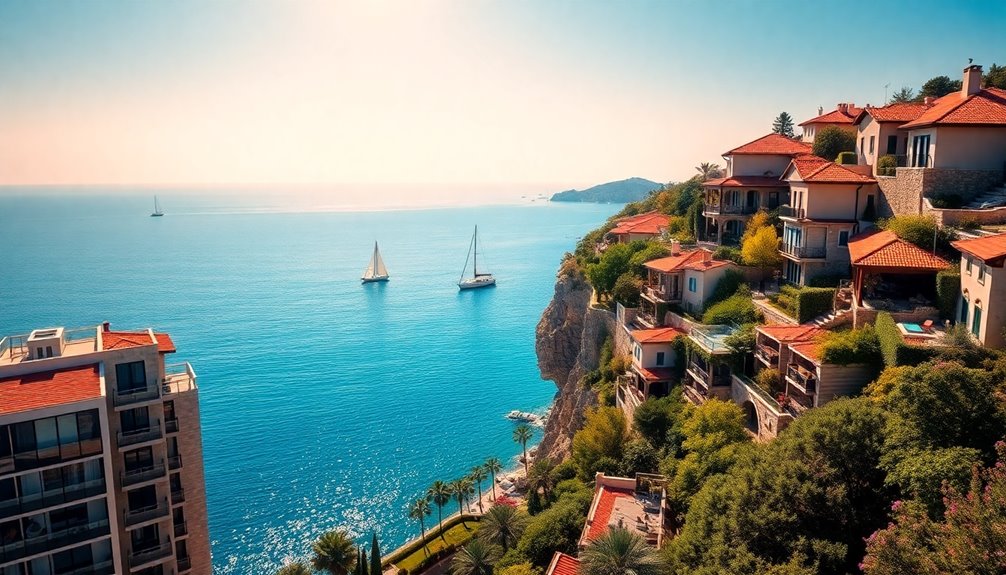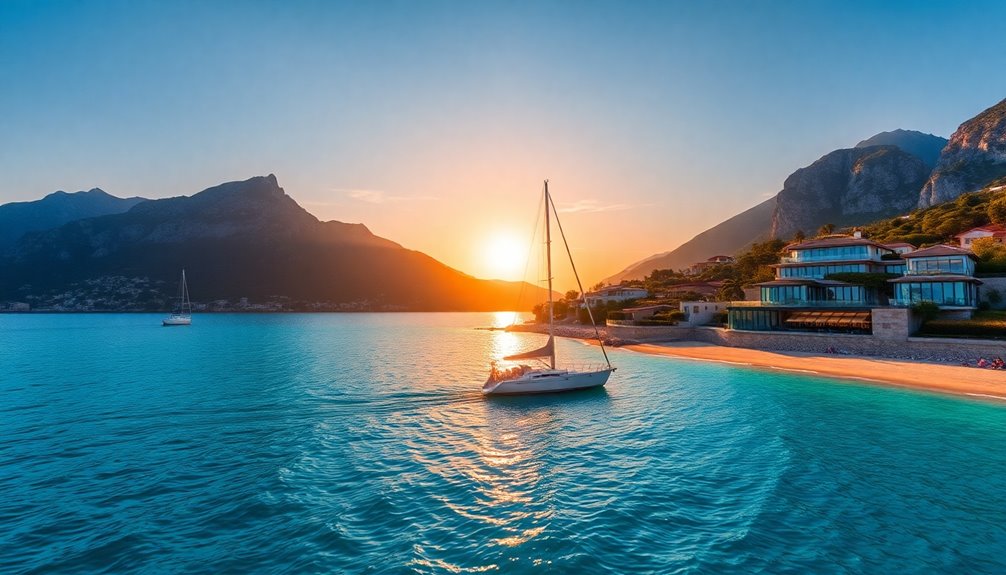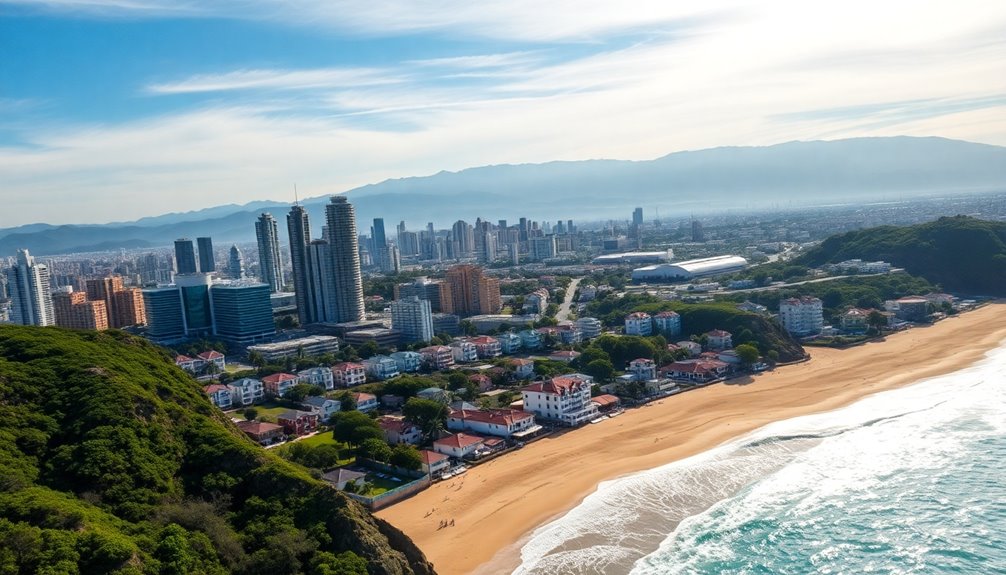If you're looking into Croatia's real estate market, you're in for an exciting opportunity. Prices, especially in coastal areas like Istria and Dalmatia, have jumped nearly 10% this past year, driven by high demand for vacation rentals and limited supply. Urban centers like Zagreb and Split are attracting remote workers, making them appealing for investment. Keep in mind the importance of legal diligence and dealing with potential language barriers. Understanding these dynamics will give you a competitive edge. Stick around to uncover more insights that can help shape your investment decisions.
Key Takeaways
- Coastal regions like Istria and Dalmatia offer lucrative vacation rental investments driven by rising tourism and limited property supply.
- Urban areas such as Zagreb and Split attract remote workers, with modern apartments appealing to both locals and expatriates.
- Average property prices in coastal areas are around €2,059 per sq. m, reflecting high demand and tight supply.
- Foreign investors must conduct due diligence, ensuring legal compliance and understanding local regulations to avoid potential issues.
- Hiring bilingual professionals and utilizing translation services can bridge communication gaps, facilitating smoother property transactions in Croatia.
Current Market Trends

The Croatian real estate market is experiencing remarkable growth, with house prices increasing by nearly 10% in just a year. In Q2 2025, prices surged by 9.96% compared to the previous year, making Croatia the standout performer in the EU. The nationwide house price index jumped by 13.73% in Q2 2023, indicating strong demand.
You'll find that new dwelling sales rose by 25.9% in H1 2023, with coastal areas seeing an impressive 53.9% increase. This trend reflects a growing appetite for properties in holiday destinations, driven by tourism demand. In contrast, Zagreb's market showed only a slight increase in sales, suggesting that while the capital remains stable, other regions are thriving.
Moreover, average prices per square meter illustrate regional variations, with new flats averaging €2,835 in Zagreb and €2,177 elsewhere. The high demand in Split, particularly in the old town, is pushing prices even higher. In addition, the average price of new dwellings in Croatia reached €2,377 per sq. m, highlighting the significant growth in property values.
With the mortgage market also on the rise, housing loans increased by 11.3% in early 2023, supporting this dynamic market. So, if you're considering investing, now might be the perfect time to explore options in Croatia.
Investment Opportunities Overview

With Croatia’s real estate market booming, investors have a wealth of opportunities to explore. The coastal regions, particularly Istria, Dalmatia, and Dubrovnik, are ripe for investment thanks to increasing tourism. Properties in these areas are perfect for vacation rentals, offering a solid return on investment. The government is also enhancing the business climate to attract more tourism investments, which is expected to drive property prices higher. Moreover, recent improvements in property registration processes are making it easier for investors to navigate the market. In addition to coastal regions, Croatia also offers attractive investment opportunities in its inland areas. These regions, such as Zagreb and Slavonia, are seeing an increase in demand for residential and commercial properties. The government’s efforts to improve infrastructure and promote economic development in these areas are further boosting their investment potential. For investors looking for international opportunities, Cyprus property investment opportunities are also worth considering, especially given the country’s growing real estate market and attractive tax incentives for foreign investors.
Urban properties in cities like Dubrovnik, Split, and Zadar are in high demand, catering to both remote workers and locals. The mix of high-value and mid-range options allows you to find something that fits your budget. As building permits rise, the market is responding to the growing need for urban housing.
Don't overlook lesser-known regions like Slavonia, where lower property prices present unique opportunities. These areas can provide authentic Croatian experiences and potential long-term appreciation.
However, be mindful of legal and financial considerations. Foreign buyers, especially non-EU nationals, need to navigate approval processes. Understanding local taxes and mortgage requirements will also be essential for your investment strategy.
Coastal Property Insights

Coastal properties in Croatia have become a hot commodity, attracting both local and foreign investors keen to capitalize on the booming tourism market. The allure of the Adriatic coast, with its stunning views and vibrant culture, makes it a prime investment area. Key drivers of property prices include proximity to the coast, tourism growth, and limited land availability for new developments. In fact, Croatia identified as Europe's fastest-growing real estate market highlights its appeal to investors.
Here's a quick overview of the factors influencing coastal property insights:
| Factors | Details |
|---|---|
| Proximity to Coast | Higher prices in popular cities and tourist areas |
| Tourism Impact | Stronger demand in Istria and Dalmatia |
| Economic Development | Developed infrastructure boosts prices |
| Land Availability | Limited land keeps supply tight |
| Government Initiatives | Improved infrastructure enhances property values |
In popular locations like Dubrovnik, Split, and Istria, prices have surged, with foreign buyers driving demand. For instance, the average price for a square meter of newly developed flats reached €2,059, reflecting a significant increase. With the recovery of the tourism sector and the rise of digital nomads, investing in coastal properties is a promising opportunity.
Urban Investment Highlights

As interest in Croatia's real estate market expands beyond its stunning coastline, urban areas are stepping into the spotlight. The demand for urban properties is steadily rising, fueled by a growing economy and an influx of tourists.
Remote work trends are reshaping lifestyles, making locations like Zagreb, Split, and Dubrovnik increasingly appealing for both locals and expatriates seeking that work-leisure balance.
In these urban centers, modern apartments combine historical and contemporary features, while office spaces are in high demand due to the booming tech sector. Retail properties in tourist-heavy areas promise high returns, particularly in popular shopping districts. Additionally, the tourism boom is significantly boosting property demand in urban areas.
Investing in urban apartments can yield attractive rental income, especially in cities like Osijek, where gross rental yields range from 4.37% to 5.27%.
The well-developed infrastructure and vibrant lifestyle in urban areas offer easy access to amenities, public transport, and cultural experiences. Engaging in local festivals and community events enhances your investment's appeal, making urban properties not just a financial decision, but a lifestyle choice as well.
Pricing and Affordability Factors

When you're looking at Croatia's coastal property market, you'll notice that prices can vary considerably from region to region. With average costs hovering around 3,000 € per square meter, understanding local trends becomes vital for making informed decisions. Additionally, factors like income levels and homeownership rates in urban areas play an important role in shaping affordability. The market has seen a significant price increase of approximately 30% since 2020, reflecting the growing demand for coastal properties.
Coastal Property Pricing Trends
Steering through the Croatian coastal property market can feel like a thrilling adventure, especially with the significant pricing trends shaped by location and demand.
Properties right on the sea or in the first row command a staggering 60% premium compared to those over 300 meters away. If you're eyeing a sea view, expect a 20-30% increase in value, with northern regions like Istria seeing an impressive 105% hike.
High demand from tourists fuels prices, particularly in hotspots like Dubrovnik and Split, where foreign investment further complicates the landscape. The surge in tourism boosts accommodation needs, driving prices up in sought-after areas like Medulin and Porec. Additionally, the shift toward Croatian islands is reshaping the market amid overcrowding in popular spots.
Economic stability and infrastructure improvements enhance property values, making previously overlooked areas more appealing. Coastal properties continue to attract significant interest, especially from foreign buyers, as they seek vacation homes in picturesque locations.
As the market forecasts a 3% to 7% price rise by 2025, you'll find tech-equipped, energy-efficient properties in high demand, especially in urban centers.
Embrace the excitement of finding your coastal gem, but stay alert to these dynamic pricing trends!
Urban Investment Affordability Insights
Steering through the urban investment landscape in Croatia reveals a complex interplay of pricing and affordability factors that can greatly impact your decisions. Understanding these dynamics is essential for making informed investments, especially in high-demand areas like Zagreb, Rijeka, and Split.
Here are four key factors to take into account:
- Strong Demand: There's a noticeable demand from both foreign investors and locals, particularly for residential and office spaces driven by the growing tech industry.
- Limited Supply: A constrained housing supply contributes to rising prices, making it vital to assess how this affects your investment potential. This situation is further exacerbated by local regulations that can limit new developments.
- Affordability Concerns: Current price-to-income (PTI) and price-to-rent (PTR) ratios indicate increasing affordability challenges, despite average incomes growing in some regions.
- Regional Disparities: Price variations are significant across Croatia, especially in tourist hotspots like Dubrovnik and Split, which could influence your investment strategy.
Legal Considerations for Buyers

Maneuvering the legal landscape of Croatia's real estate market requires careful attention and diligence. You'll want to start by verifying the property's legal status through the land registry. This means checking ownership and any existing encumbrances. Conduct thorough due diligence to avoid issues down the line. Additionally, ensuring legal clarity and security in property ownership is paramount to protecting your investment.
Once you've verified the property, you'll need to draft a sales contract, ideally with a lawyer's help. This contract must be notarized, and you'll typically provide a 10% deposit. If you back out, you forfeit this amount; if the seller fails to deliver, you'll get double back.
After signing the final purchase agreement, register the property in the land registry. This involves submitting the sales contract and proof of payment. Don't forget to pay the 3% real estate transfer tax, as well as any legal fees and registration costs.
| Legal Steps | Key Actions |
|---|---|
| Verification & Due Diligence | Check land registry, verify ownership |
| Contracting | Draft, notarize, and agree to terms |
| Registration & Ownership | Register property, pay transfer tax
Challenges for Foreign Investors

As a foreign investor, managing legal compliance issues in Croatia can be tricky, with regulations that may not always be straightforward. Language barriers can further complicate your understanding of contracts and local laws, making it essential to find reliable local support. Additionally, the EU-specific legal framework ensures transparency in property transactions, which can help mitigate some of these challenges. Without proper guidance, you might face significant challenges that could impact your investment experience.
Legal Compliance Issues
Maneuvering the legal landscape of Croatia's real estate market can feel overwhelming for foreign investors.
You'll encounter several legal compliance issues that require your attention to avoid potential pitfalls. Here are four key challenges to contemplate:
- Reciprocity Principle: Foreigners can buy property only if their home country offers similar rights to Croatians. EU citizens enjoy more straightforward access.
- Ownership Verification: The outdated land registers can create confusion over property ownership. You must conduct thorough checks to uncover any hidden burdens or third-party rights. Consulting legal professionals can significantly assist in ensuring proper ownership verification.
- Bureaucratic Hurdles: The administrative process can be cumbersome. Croatia ranks low in property registration and construction permits, which can delay transactions.
- Urban Planning Compliance: Maneuvering urban planning regulations is essential, especially in popular coastal areas. Non-compliance can lead to disputes or restrictions on your property.
To successfully navigate these challenges, it's wise to consult legal professionals familiar with Croatian laws.
They can help guarantee your investment is secure and compliant with existing regulations.
Language Barriers Challenges
Maneuvering the legal compliance issues in Croatia's real estate market is only part of the challenge for foreign investors. Language barriers can complicate negotiations and obscure critical information related to property purchases.
You may find that many government officials, lawyers, and real estate agents don't speak English, which exacerbates communication problems. This makes understanding legal documents and contracts particularly challenging without language proficiency. Additionally, working with real estate agents who understand local market dynamics can help bridge the communication gap and ensure you are aware of the best property options.
To mitigate these issues, hiring bilingual professionals is essential. Real estate agents and lawyers who speak multiple languages can help you communicate your needs effectively. Additionally, translation services play an essential role in ensuring you grasp contractual agreements and negotiations.
Without proper language understanding, interpreting property deeds, tax obligations, and managing bureaucratic procedures can become overwhelming. Local regulations and compliance requirements may also be misinterpreted, leading to costly mistakes.
Consider investing time in learning the Croatian language, as it can greatly enhance your interactions. Engaging with expat communities and utilizing online resources can provide valuable support in overcoming these language-related challenges.
With the right assistance, you can navigate Croatia's real estate market successfully.
Frequently Asked Questions
What Are the Financing Options for Purchasing Property in Croatia?
When you're looking to purchase property in Croatia, you've got several financing options.
Leading banks like Zagrebačka banka and Privredna banka Zagreb offer mortgage loans to foreigners. Typically, you'll need a deposit of 20-30% and proof of income.
Loan terms can cover up to 80% of the property value, with rates ranging from 1% to 5%.
Make certain your property meets all legal and energy efficiency requirements to secure your financing.
How Do Property Taxes Work in Croatia for Foreign Buyers?
Steering through the waters of property taxes in Croatia can feel like sailing through fog.
For foreign buyers, you'll encounter a property transfer tax of 3% on your purchase price, paid upfront. Most properties are free from annual taxes, except holiday homes, which might incur a small fee.
When selling, keep in mind a capital gains tax of 24% applies unless you've held the property for over two years.
Always stay informed on local regulations!
What Are the Best Times of Year to Invest in Croatian Real Estate?
The best times to invest in Croatian real estate are typically during the spring and autumn months.
During these periods, you'll find less competition from holidaymakers, allowing you to negotiate better deals.
Additionally, keep an eye on local market trends and tourism patterns; investing before peak tourist seasons can yield higher rental returns.
Always conduct thorough research and monitor economic conditions for the most informed investment decisions.
Are There Property Management Services Available for Foreign Investors?
If you're looking to simplify your property journey, you'll find a variety of property management services tailored for foreign investors.
These companies take care of everything from maintenance to marketing, ensuring you enjoy a hassle-free experience.
With their local expertise, they navigate regulations and handle guest management seamlessly.
How Can I Verify Property Titles and Ownership in Croatia?
To verify property titles and ownership in Croatia, you'll need to access the online land registry through the Ministry of Justice website.
Fill in the required fields, including the ZU number from the title deed. You can also visit the competent land registry court in person or consult a lawyer for assistance.
Checking the land register guarantees you understand the legal status of the property and any potential encumbrances before making a purchase.
Conclusion
To sum up, Croatia's real estate market offers exciting opportunities, especially if you're drawn to coastal properties or urban investments. You might worry about legal complexities, but understanding the regulations can simplify the process. Embrace the potential for growth in this vibrant market, where stunning scenery and rich culture enhance your investment. With careful planning and research, you can confidently navigate the market and find the perfect property that meets your needs and aspirations.









